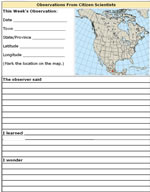Where
was the migration strongest?
Each person
below measured the pace of migration they witnessed. It's hard to compare
these observations. However, if you use standard units of measurement,
like monarchs per hour, you can suddenly see similarities and differences.
- Identify the number of monarchs each person saw.
- Identify the number of hours each person was watching.
- Figure out how many "monarchs per hour" each person saw.
Now that you have standards units, can you identify where the migration was strongest? What can you learn by comparing the observations?

For
Your Journal:
Read this week's monarch sightings and record your thoughts.
| Observations from Citizen Scientists | |
| 9/15/09
Ithaca, New York (42N, -77W) 9/16/09
Mason City, Iowa (43N, -93W) 9/13/09
Iola, Kansas (38N, -95W) 9/9/09
Clemson, South Carolina (35N, -83W) 9/14/09
Claymo, Missouri 9/10/09
Mequon, Wisconsin (43N, -88W) 9/11/09
Milwaukee, WI 9/10/09
Milwaukee, WI 9/10/09
Bird Island, MN |
Don't
Forget! Tell us how many monarchs per hour (or monarchs per minute) you see! |